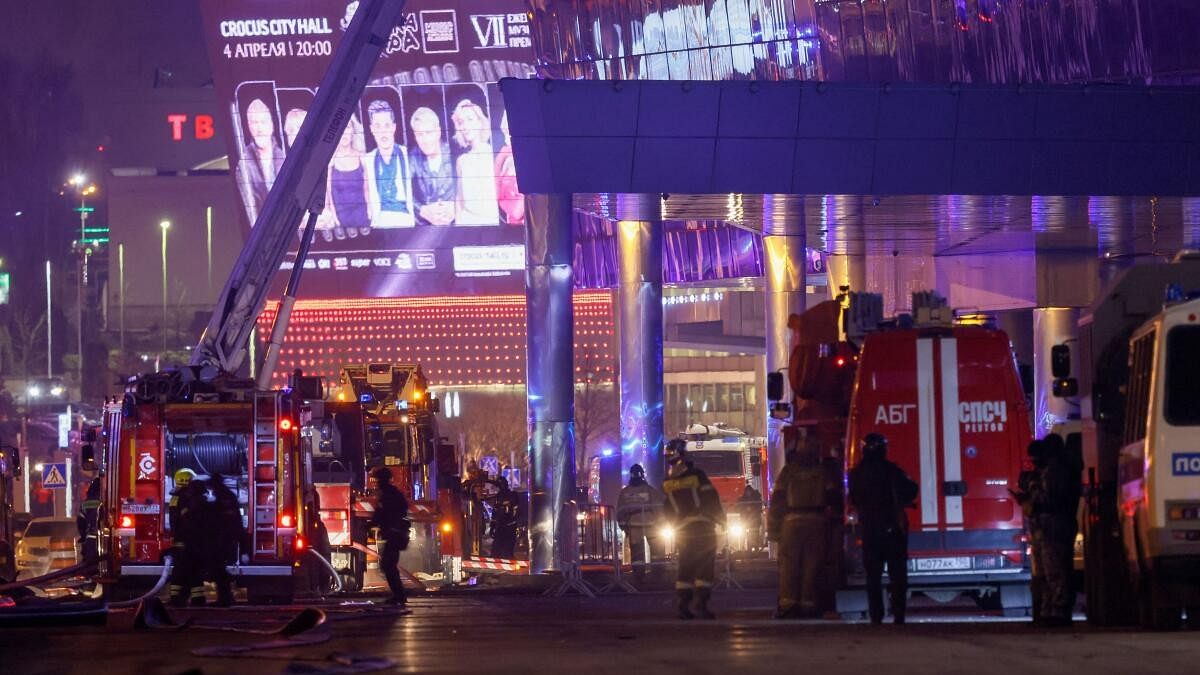
Members of Russian emergency services work near the Crocus City Hall concert venue following a shooting incident, outside Moscow, Russia.
Credit: Reuters Photo
By Bloomberg News
The deadliest terror attack in more than a decade in Moscow shattered the illusion of security that Vladimir Putin has carefully cultivated in the more than two years since he invaded Ukraine.
A group of assailants armed with automatic weapons and explosives burst into a concert hall on the outskirts of the Russian capital Friday evening, killing at least 60 and wounding at least 145 people who’d arrived for a show by the popular Picnic rock group.
A huge fire broke out after an explosion, leading to a partial collapse of the roof of the sprawling Crocus City Hall. A manhunt was underway for the suspects, who escaped by car, the RIA state news agency reported.
Islamic State claimed responsibility for the attack in a Telegram channel, according to the Associated Press, but that couldn’t be independently confirmed.
Russia’s Federal Security Service said earlier this month it prevented an assault on a Moscow synagogue by what it called an Afghan branch of Islamic State, Interfax reported.
The bloody assault on the capital Friday was a throwback to an earlier period of Putin’s quarter-century reign, when suicide bombings, most blamed on Islamists from within Russia or its neighbors, killed scores. The death toll is the worst in the capital since twin suicide attacks in Moscow subway stations killed at least 40 in 2010. Islamist groups have targeted Russia citing what they call anti-Muslim policies by the Kremlin.
The Russian president, just days after cementing his grip on the country after his reelection to a fifth term with 87 per cent of the vote, was monitoring developments closely Friday, the Kremlin said. Investigators called it a terrorist act. Authorities canceled public events and tightened security in cities across the country.
On March 7, the US Embassy in Moscow had issued a public warning that “extremists have imminent plans to target large gatherings in Moscow, to include concerts.” But Putin earlier this week dismissed that as “obvious blackmail” and the US provided no more details publicly.
While the US did not say specifically that the warning was related to the attack, National Security Council spokesperson Adrienne Watson said in a statement Friday night that “the US government had information about a planned terrorist attack in Moscow.”
“The US government also shared this information with Russian authorities in accordance with its longstanding ‘duty to warn’ policy,” she added.
President Joe Biden was being updated on the events Friday, according to the White House. There was no indication of Ukrainian involvement, Kirby said.
Some Russian state-media commentators suggested Kyiv may be to blame, but Ukraine denied any role, calling it a false-flag operation by the Kremlin.
“The US Embassy warning in early March indicates we had intelligence on some sort of planning,” said Thad Troy, a former Central Intelligence Agency Russia specialist who served in Moscow.
“I doubt it’s a false-flag. Putin is secure and doesn’t need to do that,” he said, noting that it’s still very early to speculate on the events. “It’s more likely true terrorism since Russian civilians were targeted and killed.”
Russia has also faced other major terrorist attacks in the past including the seizure of a school in Beslan in the south of the country, which led to more than 380 fatalities in 2004 and a hostage-taking in 2002 at the Nord-Ost theater in Moscow, in which 170 people died. Both of those attacks were conducted by Chechen separatists.
A suicide bombing by an Islamist extremist in the St. Petersburg subway killed 16 including the attacker in 2017.
Moscow Insulated
Moscow has been largely insulated from the direct effects of Putin’s two-year-old invasion of Ukraine. It was only this week that Putin’s spokesman formally declared the invasion a “war.”
“The obvious route for the Kremlin to spin this is that it’s something to do with the war in Ukraine,” said Charles Lichfield, deputy director of the Atlantic Council’s GeoEconomics Center in Washington. “The immediate response could be more drone attacks and ballistic attacks, but they already increased before the terrorist attacks.”
Moscow’s forces have stepped up missile strikes against Ukrainian cities and infrastructure in recent weeks, killing dozens of civilians. This week saw the biggest attacks on Kyiv to date.
At the same time, Ukraine has stepped up strikes on the Russian heartland with its troops struggling on the battlefield amid delays in vital aid from the US and other allies. Drones have hit factories and oil refineries, while attackers in border regions have staged raids.